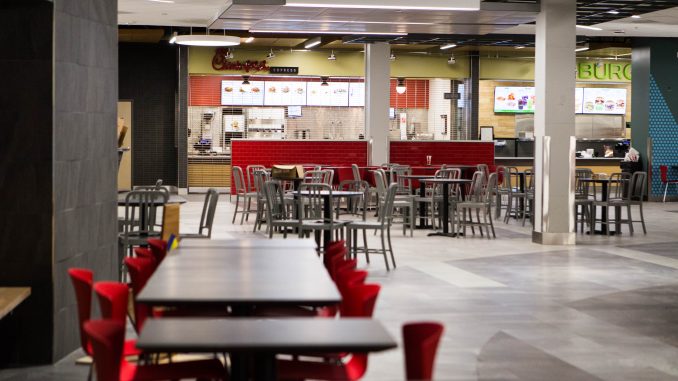
Sodexo was Temple’s food service provider for the past 28 years, but this summer Aramark took over the role. And with the start of Fall 2017, students will finally get to see the results of this transition after months of planning.
The university announced the switch from Sodexo to Aramark last October. Temple signed a 15-year contract with Aramark, a Philadelphia-based company, which officially started in May.
“Overall, we have been very pleased with the smooth transition and look forward to welcoming students back to campus,” Karen Cutler, vice president of Aramark’s corporate communications, wrote in an email.
The university transitioned to Aramark over the summer, which included the renovation of the Student Center food court. The new dining area includes seven restaurants like Chick-fil-A, BurgerFi and Saladworks.
Last fall, The Temple News reported that university food service workers feared losing their jobs during the switch to Aramark.
Aramark offered all but two of the former Sodexo employees jobs, said Michael Scales, associate vice president of business services. The two employees did not pass Aramark’s background check, which has “different standards” than Sodexo.
Aramark held a job fair earlier this month and 200 people from the North Philadelphia community attended. Of the 200 people, 58 were hired by Aramark, making dining services fully staffed and operational with around 500 Aramark employees, Scales said.
Sodexo ran various sustainability programs on campus, like composting in the Student Center and dining halls. Aramark will continue the existing programs and expand others.
Morgan Hall will begin composting and the Office of Sustainability is still “working out the final details of the composting contract,” but the office expects the program to start in late September, Kathleen Grady, the director of sustainability, wrote in an email. Johnson & Hardwick cafeteria and the Student Center already compost.
Aramark will also buy food from “local” companies and farms — an existing program from Sodexo’s as the food service provider.
Aramark wants service as close to “farm to fork” as possible, Scales said.
“The sustainability voice was well-heard,” during negotiations, said Aaron Weckstein, Temple Student Government’s director of grounds and sustainability.
In January, Weckstein told The Temple News he was worried Aramark wouldn’t uphold the existing sustainability programs after TSG was left out of negotiations between the university and Aramark.
Weckstein said TSG will create a sustainable dining task force this fall in order to further sustainability efforts in dining halls and around campus.
This summer, Weckstein and TSG’s sustainability task force also began pitching sustainability ideas to Jason Levy, senior director of Student Center operations, like an online tool to help students track the sources of their food.
The task force also suggested a kiosk that would give out reusable to-go boxes to students buying food in the Student Center. Students can then bring the box back to the kiosk where it would be washed and reused.
Weckstein said these ideas, if approved by Aramark, will not start until next fall.
In order to keep students engaged, Aramark will start its own “food service committee” made for students to give feedback.
Students can also provide feedback through Aramark’s “Voice of the Consumer” platform — an online tool where students can review their experience at any dining location on campus.
“Aramark wants to be a part of the Temple lexicon,” Scales said. “Sometimes a big corporation feels more like a distant cousin rather than an immediate family member.”


Be the first to comment